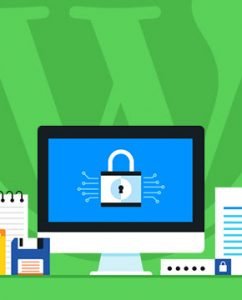There is no doubt that WordPress has become one of the most popular open source content management systems in the world. Ever since its initial release in 2003, WordPress has offered users a chance to customize and run their websites on a platform that does half the work for you. The latest statistics show that there are more than 74 652 825 active sites currently running on WordPress, which amounts to about 30% of the entire internet. However, just because WordPress is the most popular website hosting platform, it doesn’t make it the most secure one.
In fact, WordPress sites are a frequent target for cybercriminals who are looking for ways to gain unauthorized access to personal data and content. WordPress sites with weak credentials and poor security settings are the easiest target for these criminals. With thousands of sites being hacked each year, we can confirm that WordPress is not safe enough on its own. When it comes to protecting your website and data on this platform, a lot of responsibility is on you.
Tips on How to Protect Your WordPress Site
To protect your WordPress site, you must be familiar with where the security threats are coming from. A site on WordPress consists of three main parts: the core, themes, and plugins. The core and the plugins are two of the most vulnerable parts of the site, whereas the themes also contribute to the overall risk of cybersecurity threats. These threats come in multiple shapes and forms, from malware and data theft to DDoS attacks and cross-site scripting.
A great thing about WordPress is that their team of expert developers is consistently working on improving the platform’s security. However, they are not responsible for the security of themes and plugins that are being released on a regular basis. Professionals check some of these plugins, but the number of new releases is growing so fast that they cannot go through and secure all of them. In other words, it is your responsibility to make sure the plugins and themes you’re using are safe for your website.
For the sake of security, try to stay away from free themes and plugins available on the market because the paid versions are far more secure and reliable. The core of your website is the part that constantly gets improved by the team of developers who are working on increasing WordPress security. However, it is your responsibility to regularly update the website to allow these changes to take place.
Therefore, make sure to keep your site up to date and never miss a new update from the developers. The same goes for themes and plugins, which also need to be updated on time. The easiest way to ensure all components of your site are up to date is to enable the automatic security updates option, which would then let the site install updates on its own. If you would like to have more control over the updates, you can always perform them manually but keep in mind that skipping these steps will leave your site vulnerable to cybersecurity threats.
As already mentioned, WordPress sites with weak credentials are the easiest target for cybercriminals. Therefore, make sure to strengthen your credentials, create a strong password that is not shared between multiple accounts, as well as change your username from the standard “admin.” These small steps will make it far more difficult for hackers to access the back-end of your website. If you want to take the login security a step further, use captcha solutions to make the login process a bit more challenging.
Lastly, make sure the server and the internet connection you are using are secured. The best way to secure your data and site credentials is to use a Virtual Private Network (some reputable providers offer a free trial) for mobile or desktop device and route your traffic each time you log into your site. Using a VPN to hide your identity and encrypt data online will help you keep your site of the hackers’ radar. Besides, a VPN for Android will allow you to securely log into your website via public networks in coffee shops, airports, and other locations.
Invest in Secure & High-Quality Hosting
For any WordPress site a large portion of the security aspect depends on the web hosting provider who is hosting your site. Investing in a good high quality managed vps hosting provider will pay itself back in no time. As your website performance improves and your page load time decreases, your SEO also improves and brings in more visitors to your blog. If you are using WordPress to host your blog you should also speed up wordpress by performing the top optimization tasks.
Important Takeaways
Despite all the efforts in securing the platform, WordPress developers still cannot stop all cybersecurity threats that might pose a danger to your site. That is why you have to take things into your hands and improve your site’s security on your end. To do so, make sure to strengthen the login credentials, keep the site’s components up to date, avoid free themes and plugins, as well as use a VPN to route your traffic and remain anonymous online.


